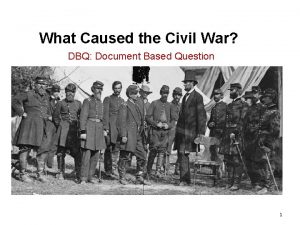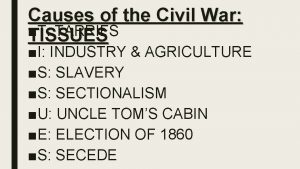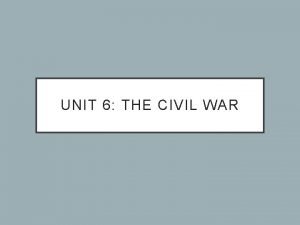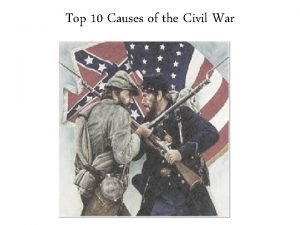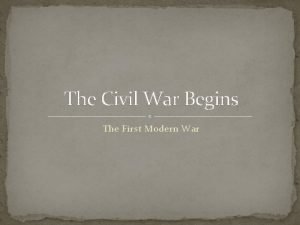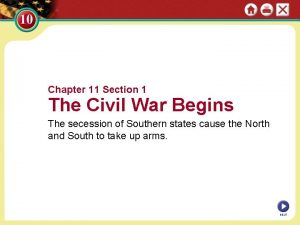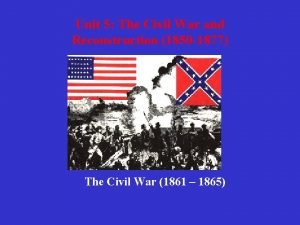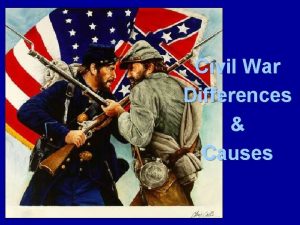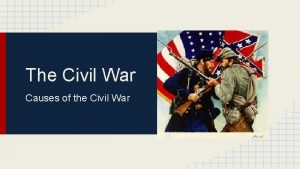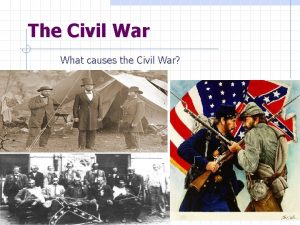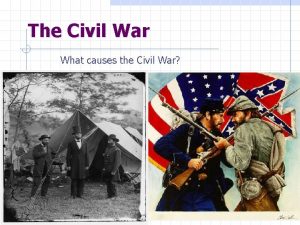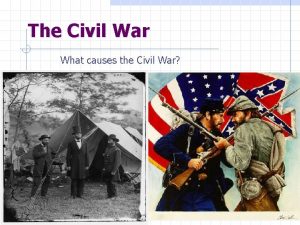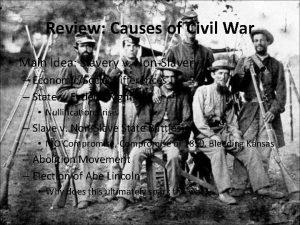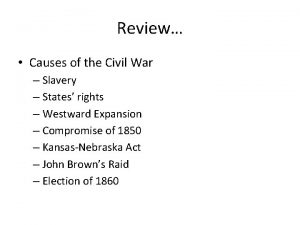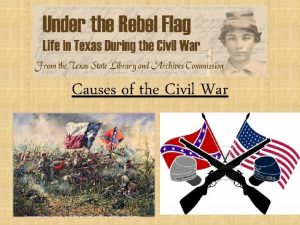Causes of the Civil War Slavery Slavery was




















- Slides: 20

Causes of the Civil War

Slavery • Slavery was allowed in the United States from the time of the Constitution.

• Many southerners believed slavery was necessary for Southern economic prosperity and must be kept.

• Many northerners believed slavery was immoral and should be abolished.

• By 1860, only 3 Western countries allowed slavery: Brazil, Cuba, and the U. S.

Missouri Compromise (1820) • Maine = Free State • Missouri = Slave State • Kept balance between slave states & free states

Compromise of 1850 • California = Free State • Slave trade abolished in Washington, D. C. • Utah and New Mexico Territory up to people who live there (popular sovereignty). • Fugitive Slave Law: Free States must help catch and return escaped slaves.

Kansas - Nebraska Act (1854) • Establishes Popular Sovereignty over slavery in Kansas & Nebraska Territory. • Repealed Missouri Compromise • Supporters of slavery—very happy • Opponents to slavery—very angry

Dred Scott Ruling (1857) • Owner takes Dred Scott to a free territory; they return to slave state & owner died • Scott has abolitionist attorneys sue for freedom • It went to the Supreme Court but he LOST • The court ruled he was NOT a citizen, but rather property and therefore could not file a lawsuit • Court officially repealed the Missouri Compromise—this allowed slavery in the territories

Lincoln’s “House Divided” Speech (1858) • Lincoln gives speech to accept Republican Party’s nomination for President. • Says country must either: Become either all slave or all free, or • Cease to be a Union of States.

Lincoln’s “House Divided” Speech (1858) “’A house divided against itself cannot stand. ’ I believe this government cannot endure, permanently half slave and half free. I do not expect the Union to be dissolved— I do not expect the house to fall—but I do expect it will cease to be divided. It will become all one thing, or all the other. ”

Lincoln-Douglas Debates (1858) • Abraham Lincoln, member of newly formed Republican Party. • Stephen A. Douglas, Democrat, responsible for Kansas-Nebraska Act • Lincoln opposed slavery and wished to limit its spread. • Douglas wanted to decide slavery using popular sovereignty & said a territory could exclude slavery. • Douglas won the Senate election but lost popularity with many Southerners. • Lincoln became very well-known and popular nationwide.

John Brown attacks Harpers Ferry (1859) • Brown, with 18 followers, seized federal arsenal in Harpers Ferry, Virginia. • He wanted slaves to revolt • Robert E. Lee and troops captured Brown and his followers. • Brown was tried, convicted, and hanged.

Lincoln elected President (1860) • Lincoln wins Presidency without a majority of popular votes. • Declares not to end slavery in south, but end expansion in territories. • Southerners see him as a threat to their lifestyle.

Southern States Secede from Union. Starting with South Carolina, states secede from the Union. (December 1860) These states form the Confederacy - a new government of Southern States. Mississippi, Florida, Alabama, Georgia, Louisiana, & Texas (1861) *secede: to withdraw

• Jefferson Davis elected President. • Lincoln hopes for peace, but forced to arm Federal forts in the South

Fort Sumter Attacked (April 12, 1861) • Fort Sumter was attacked April 12, 1861 • Confederate cannons fire on Fort Sumter, South Carolina. • Union forces surrender after 30 hours (and no deaths!)

The Civil War Has Begun!

Name ________ Date ______ Per. ____ 1. What is this article about? 2. What is the point of view? How can you tell (Cite evidence from the article) 3. What was the purpose of this article? What was it trying to do?

Name ________ 1. What is this an ad for? What was its purpose? 2. How does this ad try to persuade those who see it? (Cite evidence from the ad 0 3. What is the point of view? How can you tell (Cite evidence from the ad)
 Causes of the english civil war
Causes of the english civil war What caused the civil war dbq
What caused the civil war dbq Tissues causes of civil war
Tissues causes of civil war Causes of civil war
Causes of civil war What are the 3 main causes of the civil war
What are the 3 main causes of the civil war Causes of the civil war jeopardy
Causes of the civil war jeopardy Causes of the civil war
Causes of the civil war What were the 4 main causes of the civil war
What were the 4 main causes of the civil war Why was the civil war the first modern war
Why was the civil war the first modern war Chapter 16 lesson 2 challenges to slavery
Chapter 16 lesson 2 challenges to slavery Civil rights webquest
Civil rights webquest Proximate causation biology example
Proximate causation biology example Proximate causation vs ultimate causation
Proximate causation vs ultimate causation English civil wars timeline
English civil wars timeline Who won the chinese civil war
Who won the chinese civil war Aftershock beyond the civil war
Aftershock beyond the civil war Civil war vocabulary list
Civil war vocabulary list Who wonthe battle of shiloh
Who wonthe battle of shiloh Gettysburg gtech
Gettysburg gtech Chapter 11 section 1 guided reading the civil war begins
Chapter 11 section 1 guided reading the civil war begins Unit 5 civil war and reconstruction
Unit 5 civil war and reconstruction

